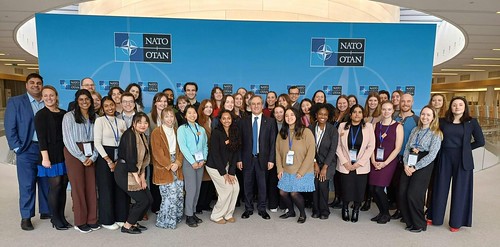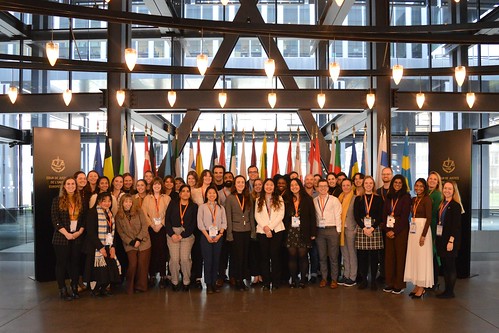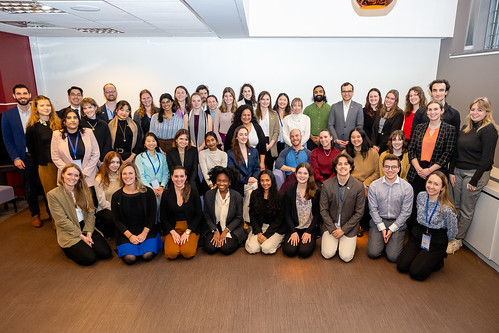In February 2024, the Fulbright Commission in Brussels welcomed American Fulbright grantees to Belgium and Luxembourg for the forty-first annual Fulbright Seminar to the European Union and NATO.
Participants included U.S. Fulbright grantees based in Austria, Belgium, Bulgaria, Czech Republic, Denmark, France, Germany, Greece, Hungary, Ireland, Italy, the Netherlands, Norway, Poland, Portugal, Romania, Slovakia, Spain, Sweden, Turkey, and the United Kingdom as well as participants in the Fulbright Schuman Program. Grantees came from a wide range of backgrounds, including political science, philosophy, economics, law, sociology, environmental science, biology, and others. Participants had varying degrees of acquaintance with NATO and with the institutions of the European Union.
The seminar kicked off in Luxembourg City, where participants were welcomed to the U.S. Embassy to Luxembourg for a briefing on the history of European integration.
They were then invited to a reception in honor of the 75th anniversary of the Fulbright Program in Luxembourg, hosted by U.S. Ambassador to Luxembourg, Thomas Barrett. The reception was attended by a number of local Fulbright grantees and alumni, including Luxembourgish Prime Minister Luc Frieden. Prime Minister Frieden spoke to participants about the impact of his experience as a Fulbright grantee to Harvard Law School and about his belief in the importance of institutions like the European Union and NATO.
The next morning, seminar participants visited the Court of Justice of the European Union. They received an introduction to the Court from Dr. Paul Nihoul, a Belgian Fulbright alumnus and judge on the General Court, and had the opportunity to sit in on a hearing.
Following the hearing, participants had the opportunity to speak with Dr. Koen Lenaerts, the President of the Court of Justice. President Lenaerts reflected on the role of the Court and on the similarities and differences between Europe and the United States of America, where he studied as a Fulbright grantee.
Back in Brussels on Thursday, participants focused again on the institutions of the European Union. The day started with a visit to the European Commission, where Marc Taquet-Graziani of the Secretariat-General provided a thorough explanation of the role of the commsision as the political executive of the European Union. He offered valuable insights into its organizational structure and the various roles that the European Commission plays in the governance of the European Union. Following this, Robert Gangl of the Directorate-General for Economic and Financial Affairs, delivered a captivating presentation on the economic dimension of cooperation. Participants gained valuable insights into the EU’s economic policies and their impact on the lives of its citizens. A final presentation was given by Oluf Nielsen of the Directorate-General for Communications Networks, Content, and Technology, who shared his expertise on the digital economy.
The day continued with a visit to the European Parliament. There, grantees learned more about the history of the European Union and its legislative branch. Participants were able to ask questions about the history and structure of the European Parliament and to discuss the upcoming elections.
On Friday, the final day of the seminar began with a visit to NATO Headquarters. Participants had the privilege of attending a briefing on U.S.-NATO relations by Christine Getzler Vaughan of the U.S. Mission to NATO. They also had the opportunity to learn about NATO’s current agenda from Nicola de Santis, the Head of the Engagements Section at NATO’s Public Diplomacy Division. The visit continued with a session on NATO’s support for Ukraine, presented by representatives from the NATO Liaison Office in Ukraine. A representative of the International Military Staff also provided insights into NATO’s military posture.
One of the highlights of the day was a meeting with the U.S. Ambassador to NATO, Julianne Smith. Ambassador Smith reflected on her experience in Brussels and answered participants’ questions about the relationship between the U.S. and NATO, leaving them inspired and motivated.
The seminar concluded with a briefing at the U.S. Mission to the European Union on Friday afternoon, where Foreign Service Officers Saad Bokhari, Patrick Cho, Danielle Nesmith, and Aroosha Rana provided insight into their careers and shared their perspectives on the U.S.-EU relationship.
According to one participant: “This seminar has been a highlight of my Fulbright experience so far! I found all of the stops incredibly valuable, exciting, and educational. I am so happy that we had the privilege of hearing from the Prime Minister of Luxembourg, the President of the European Court of Justice, and the U.S. Ambassador to NATO, among other figures. I also loved getting to know the other participants and forming connections with Fulbrighters in other countries. I think I’ve made some lasting professional relationships and some lasting friendships, and I feel informed, empowered, and energized as I return to the rest of my Fulbright grant.”
Another participant shared: “The EU-NATO has been an incredible experience that I will remember for the rest of my life. Not only did it deepen my knowledge of European institutions and politics, but it helped me understand my role as a U.S. Fulbrighter within it.”
The Fulbright Commission would like to thank the grantees who participated in the EU-NATO Seminar as well as the various institutions and speakers who welcomed them throughout the week.








